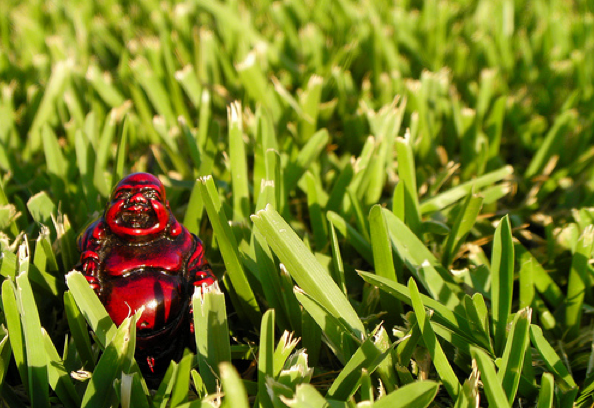“The grass is always greener where you water it.” –Unknown
The first time I heard the phrase “the grass is always greener on the other side,” I was 12 years old—and I heard it in song.
I didn’t know at the time that this was from the play Woman of the Year, because two women in my theater group sang it as part of a musical review. Still, it made a deep impression on me.
One of the characters is a housewife, and the other is a famous TV news personality—and yet they both feel certain they’re missing out on amazing experiences because of the lifestyle they’ve chosen.
The celebrity sings, “I can see you planning picnics. That’s wonderful!”
The housewife responds, “What’s so wonderful? Eating at the White House! That’s wonderful!”
And the song goes on like this, with two women comparing their lives, and assuming the other has it better.
Back then, I felt painfully envious of my sister, who frequently won starring roles and also had a boyfriend. It didn’t occur to me that focusing on everything she had wasn’t a proactive way to create the life I wanted.
Comparing my talent to hers didn’t help me land any roles. It just made me feel inadequate—which showed in my auditions. Comparing my looks to hers didn’t help me feel better about myself. It just made me feel unattractive—which showed in the way I carried myself.
I also didn’t realize her life wasn’t perfect, and she had plenty of her own challenges.
I’ve since learned that there is always going to be someone else who appears to have everything we want, especially in the digital age, where many of us narrate all the fun we’re having through updates, photos, and videos online.
But we tend to overestimate other people’s happiness and forget that in every life, there is a little sunshine and a little rain.
No matter how perfect someone else’s life seems, they still have their own struggles. And they still deal with the natural human instinct to wonder what else is out there, and if there’s something else they should be doing.
We can either focus on other people’s perceived good fortune, or focus our energy on recognizing and fostering our own.
We do that by planting tiny seeds for joy, and then watering them with our attention.
What seeds will you plant today?
Photo by onecog2many
About Lori Deschene
Lori Deschene is the founder of Tiny Buddha. She started the site after struggling with depression, bulimia, c-PTSD, and toxic shame so she could recycle her former pain into something useful and inspire others to do the same. You can find her books, including Tiny Buddha’s Gratitude Journal and Tiny Buddha’s Worry Journal, here and learn more about her eCourse, Recreate Your Life Story, if you’re ready to transform your life and become the person you want to be.
- Web |
- More Posts













 Though I run this site, it is not mine. It's ours. It's not about me. It's about us. Your stories and your wisdom are just as meaningful as mine.
Though I run this site, it is not mine. It's ours. It's not about me. It's about us. Your stories and your wisdom are just as meaningful as mine.
I especially like the quote at the beginning. Instead of wondering how good it is on the other side make the side you’re on greener so they wonder how good your side is. Thanks, Lori.
You’re welcome Dwayne. =)
Wow. I needed this post today. I’ve needed it for the last few months. I’ve been focusing on someone else’s perceived happiness and comparing it to my perceived lack of happiness and it’s getting me nowhere quickly. Thank you, Lori. The grass is wonderful, green and lush in my life and that’s now my focus.
You’re welcome Jenn. Happy watering. =)
I love that quote Lori. Not just that the grass is greener, but it’s greener where you water it. I see it being something that is nurtured and so it grows. Reminding me more than ever that where my attention is, so my life goes. Thanks for the reminder Lori.
You’re most welcome Elle. I just saw this quote for the first time recently, and I couldn’t wait to share it here!
I loved this post and so look forward to reading your messages! Thank you for sharing your goodness.
You’re most welcome. I’m so glad you enjoy my posts! =)
I will plant the seeds of COURAGE , ENDURANCE & GRATITUDE Today .. Yes i will.
Beautiful. =)
Thank you for writing this. Made my day!
You’re most welcome!
“The grass is always greener where you water it.” –Unknown I love that…and know how very true it is. I’ve never really been much of a jealous person. However there have been times I’ve been a little envious of those who seemed to have it all together…until I learned better.
Great Post…We all need to be a little less focused on what we “think” is going on. Have compassion and understanding, and water our own lives!!
I used to think there were people who have it all together. Then I realized none of us do. However, as the quote, “We may not have it all together, but together we have it all.” 🙂
I still don’t get it.. :'(
This is so beautifully put! Thank you for your words and I shall start to incorporate this phrase rather than “the grass is greener on the other side.” Many blessings!
You are most welcome!
LOVED the post Lori, it was much needed! I know I am so blessed with all that I have but because I wasn’t able to finish my education, I always wonder what life would be like if I had finished. Could I have gotten the job of my dreams that paid really well? What doors would it have opened for me? I have wasted a lot of time wondering about the “what if’s” and “I wish I was more like her” but I am missing the enjoyment of my 1 year old daughter and the fact that I am blessed enough to be a stay at home mom. I am missing out and wasting my time by comparing myself to others. You are right, in all reality, we each have our blessings but we each have our daily struggles!
Indeed! It must be so exciting to be a new mom, and how wonderful you are able to stay home with her. =)
Thanks Lori. Some meanings go straight to your heart, and this one did.
I am going to start planting tiny seeds for joy, and then keep watering them with my attention.
And I will remember the simple truth, so well put – The grass is alway greener where you water it.
You are most welcome Sudha!
I am Doctor and right from the early days in Medical School, Competition, comparison is forced upon Medical students to perform always better. To have good rank so that you can have good speciality and you can get more income as compared to others. I had got ALL what I want, but now the habit of comparing and competing is built up since so many years which refuse to go away. The people and society are also in some or other way comparing like — Oh, he has got such and such car … OR He his attached to so many Hospital making a big income .. I sometimes find difficult to maintain my calm.
Your post really gives some relief towards this. But my mind again wants to say ” By assuming everyone has their problems, Am I trying to downplay others achievments or wants to procrastinate myself ?” This constant battle of thoughts is going on since many months together.
Any comments please ?
Hi there Jit,
You bring up an interesting question, about whether or not you’d be trying to downplay other people’s achievements if you recognized their lives aren’t perfect. One thing that’s helped me is to focus less on what other people have and more on what I actually want. So then it’s not about pretending other people haven’t accomplished things–it’s about knowing if their accomplishments are actually things I’d like to do, or things I just feel I should.
So my question for you is: If no one else had that great car or income, would you really feel a need to chase it? If you would–if you truly want those things for yourself–then that’s one thing. But if you only think you need to have it because someone else does, perhaps they wouldn’t make you happy after all. And in the end, isn’t that what we all really want–to create a sense of peace and happiness?
Much love,
Lori
Hi there Jit,
You bring up an interesting question, about whether or not you’d be trying to downplay other people’s achievements if you recognized their lives aren’t perfect. One thing that’s helped me is to focus less on what other people have and more on what I actually want. So then it’s not about pretending other people haven’t accomplished things–it’s about knowing if their accomplishments are actually things I’d like to do, or things I just feel I should.
So my question for you is: If no one else had that great car or income, would you really feel a need to chase it? If you would–if you truly want those things for yourself–then that’s one thing. But if you only think you need to have it because someone else does, perhaps they wouldn’t make you happy after all. And in the end, isn’t that what we all really want–to create a sense of peace and happiness?
Much love,
Lori
Love this! Such a great message for parents to give their children. Imagine!
Thanks Maggie!
LOVE ur blogs!!! Why?Because it is like u are inside my head,putting words to my emotions,feelings which I have….It is a comfort to know I’m not so “unique” in my concerns,and fears.Bless you,and may ur followers increase as it should.
Thanks so much Debra. That’s a big part of why I run this site–I love knowing that none of us are alone. We all feel and deal with the same things, and we can all help each other. =)